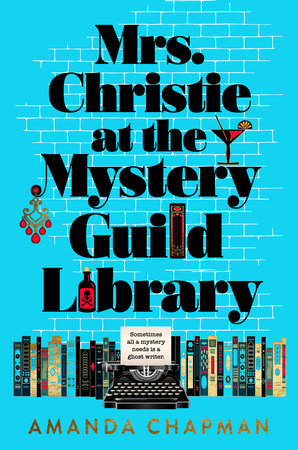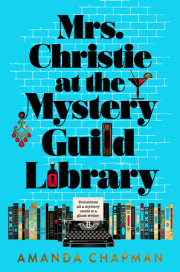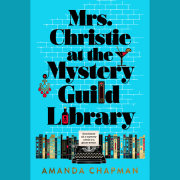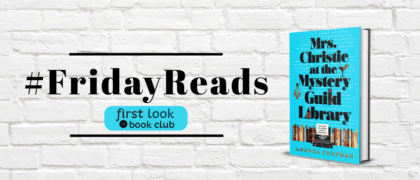One
"Do you think it might be beyond the realms of possibility that I might get a drink?"
-Mr. Venables, The Pale Horse
My name is Tory Van Dyne. I am a book conservator at New York's Mystery Guild Library, and until that rainy late-September evening when a woman claiming to be the Queen of Crime first materialized in the library's Christie Room, I'd been working very hard at living a safe, sane, sensible life. A life shielded from the eccentricities of my Old New York family (including a grandfather given to penning naughty limericks and the aforementioned great-aunt), the antics of my socialite/actor cousin Nicola (popularly known as one of the three Belles of Broadway), and my own particular brand of crazy (about which, I'd always felt, the least said the better). I lived instead a quiet life. A safe, sane, sensible life.
Later, when I'd had a chance to process our little encounter, I realized it made a kind of weird sense that if my guest was indeed Agatha Christie (which I did not believe for a minute), and if she had indeed decided to visit New York City some fifty years after she'd been airlifted to the Great Beyond (which I also did not believe for a minute), she might indeed choose New York's Mystery Guild Library as a home base. Even in the After Life, she would surely have heard about the library's Agatha Christie Room, a very close replica of British mystery novelist Agatha Christie's personal library in Greenway House, her holiday home in Devon, England.
The Christie Room had been a labor of love masterminded by my grandmother Margaret Jane Van Dyne in what was at the time her home on Washington Square North and which now houses the Mystery Guild Library on the first two floors and Yours Truly on the two floors above. The house is one of the dozen or so remaining Greek Revival redbrick, marble-trimmed town houses in what is known as "The Row" overlooking Greenwich Village's Washington Square Park, and it is still as covetable an address as it was in 1880 when Henry James limned the life of the wealthy in his masterpiece, Washington Square. I had always loved the park. It is small, no more than a few square city blocks, and I loved its intimacy, its shaded benches, its great round fountain in the central plaza. And, like all good New Yorkers, I loved its monumental Washington Arch, the park's official entrance at the foot of Fifth Avenue. Grandmother's house on Washington Square North was a mere half block to the west of Fifth, and from my tiny Juliet balcony on the third floor, I had enviable views across to the park and the arch.
Grandmother, one of the last of the New York Montagues (railroads and coal), had brought the house to her marriage to Tyler Anson Van Dyne (finance and real estate) in 1947. But Margaret Jane had been a smart cookie. She knew whom and what she was marrying ("a Van Dyne, yes, but a devil with women and a damn fool with money"). And so she had held on to her girlhood home as her plan B, leasing it at an exorbitant rent to "the right sort of people." By which she meant her sort of people.
Her foresight paid off. When my grandfather finally chased one extramarital skirt too many, she'd shocked her social circle by divorcing him. "I could overlook it in his younger days," Grandmother had sniffed. "But in a man of sixty, what had been merely a failing now began to look like bad taste." She'd then given her bewildered tenants exactly thirty days to remove themselves from her house and betook herself from the Van Dyne mansion on Upper Fifth Avenue all the way downtown to Washington Square. There she lived quite happily with her extensive collection of Agatha Christie first editions, spending the last twenty years of her life absorbed in re-creating as closely as possible Mrs. Christie's library at Greenway House.
And when I say as closely as possible, I am not kidding.
The Christie Room had been carved out of Grandmother's second-floor drawing room overlooking the park. It was not only an architectural replica of the Greenway library-including faithful reproductions of its wonderfully eclectic furnishings-it also housed copies-hunted down over years by my grandmother-of many of the more than four thousand volumes on the Greenway library shelves. These, of course, included Dame Agatha's own sixty-six mystery novels (every one of which I had read, and in many cases reread, much to Grandmother's delight), nineteen plays and two memoirs.
The room itself was a comfortable space, large but quietly informal, with cream walls and white bookshelves and a down-filled blue damask couch facing the fireplace. That couch fairly begged you to pick up one of Mrs. Christie's mysteries (maybe The Body in the Library) and curl up for a good read. Or you could browse the offerings in its cozy alcove, where a collection of bargeware teapots shared space with a well-stocked bar cart, an armchair upholstered in dull gold velvet with an intricate design recalling Egyptian hieroglyphics, and a navy velvet settee edged with gold-embroidered trim. There you might want to pick up one of the six romance novels the author had also written under the pen name Mary Westmacott.
But the most interesting volumes, at least to Grandmother-whose goal was to plumb Mrs. Christie's very mind-were the books used by the writer in her work, including, of course, Martindale's Extra Pharmacopoeia, with its vast compendium of poisons. Or you could while away an hour or two with some other delight from Mrs. Christie's rather eclectic collection. Perhaps a treatise on Buddhism or D. M. C. Prichard's Commentary on the Laws of Croquet. Or, if you were one of the library's younger readers-and we have a surprisingly large number of them-a copy of one of the many books Mrs. Christie had read herself as a child and lovingly saved. Perhaps Frances Browne's Granny's Wonderful Chair and Its Tales of Fairy Times, which had been given to the young Agatha Miller by her own grandmother. I, though, was partial to ephemera like the first edition of Robert Vermeire's 1922 classic Cocktails: How to Mix Them, which I happened to know had cost Grandmother a cool couple grand.
I loved the Christie Room. The truth is, over the past several years I'd become out of necessity a fairly solitary creature, and I often retreated to its soothing quiet when unwelcome memories invaded. On those days, after I'd finished my work and ensured that all of the library's patrons had left for the day-or, as on that evening, after an interminable Sunday-afternoon dinner with the family-I would lock the heavy oak front door and take shelter in the Christie Room. There I would pull out a volume at random from the shelves and, with a grateful sigh, sink into the soft cushions of the couch and lose myself in whatever subject had once caught Mrs. Christie's attention. Like water closets.
Now, looking back to that night-that rainy Sunday night in late September when a woman wearing well-polished brogues, sensible tweeds, five strands of big, fat pearls and a hat like a deflated soufflé introduced herself as Agatha Christie-I wonder if I somehow knew then that my safe, sane, sensible life was as dead as a body with a knife in its back in one of Dame Agatha's own mysteries.
What I certainly did know at the time was that I was sitting in the same room with a woman who thought she was Agatha Christie. Tread carefully here, Tory.
What really worried me was that my guest knew enough about her alter ego to be aware that after Agatha Christie's divorce from her first husband, Archie Christie, the author had continued to write mysteries under her married name-even after her later marriage to archaeologist Max Mallowan in 1930. This knowledge on the part of my visitor argued for a certain amount of obsessiveness on her part.
Oh well, I comforted myself, at least she doesn't think she's a goldfish.
I took a deep, calming breath. Which never works. "Yes, well, the fact remains that the library is closed, Mrs., um, Mallowan."
"Why don't you just call me Mrs. Christie?" the woman said, with a smile of considerable charm. "Everyone did." Was it weird that this woman was referring to herself in the past tense? "Except my dear friends, of course, who simply called me Agatha in the modern style, and my household staff and local tradesmen, to whom I was, of course, Lady Mallowan."
She said the title-which the real Agatha Christie had acquired not when she herself had been made a Dame Commander of the Order of the British Empire by Queen Elizabeth in 1971 but three years earlier, when her archaeologist husband had been awarded his OBE-with a kind of childlike pride. I was reminded of the author's rather sweet admission in her autobiography that her childhood dream was to be "Lady Agatha" one day. But this, I reminded myself, was no time for reflections on Agatha Christie's childhood. Particularly when Agatha Christie's childhood was not the childhood of the woman sitting in the Christie Room at the moment.
I attempted to stem the flow. "Yes, certainly. Whatever you'd like, Mrs., um, Christie."
I also tried for a sympathetic and trustworthy smile but was pretty sure that I just ended up looking as peculiar as I felt. "Maybe there's somebody I could call?" Like your keeper?
Because it was obvious that this lady wasn't going anywhere without a lot of encouragement. She'd settled back in her armchair and was gazing around her with unconcealed delight. "Oh no, I don't think so, Miss . . . ?"
"Van Dyne. Victoria Van Dyne."
"Ah," the woman murmured, almost to herself. "After the great queen." Well, no, after my great-grandmother, but fine. "I was only eleven when the Queen died, you know. It made a very great impression on me. It was the same year that my beloved father died. Life took on a completely different complexion after my father's death . . ." Her voice trailed away.
I wasn't sure how to respond. There was real grief here, I was sure of it. But before I could say anything, she shook her head slightly, as if to bring herself back from her memories.
"How do you do, Miss Van Dyne," she said, holding out a gracious hand.
I crossed to the woman seated in the armchair and took the offered hand. Her grip was firm and warm. Real. Firm and warm and real. "How do you do," I said.
[AQ: not possible to capture an image of her looking at two stacks of book on either side of her. Rephrase?]
It was then that my eye was caught by the black-and-white photograph on the small round table next to the room's fireplace. I'd seen the photo so many times that I'd stopped really seeing it. It was that famous image of Agatha Christie seated at a desk signing copies of her latest whodunit and looking a bit worriedly at two crooked stacks of books piled perilously high on either side of her.
The same woman who is now sitting in the Christie Room of the Mystery Guild Library talking to you, Tory Van Dyne, about water closets.
It took me a second to get a grip. If anyone had a genetic predisposition to, shall we say, over-imagination, it was probably Yours Truly. I needed to watch out. So this woman is a dead ringer for Agatha Christie, I told myself, hardly registering my unfortunate choice of words. That doesn't mean she is Agatha Christie. You shook her hand. It was warm. The woman is real.
I reminded myself of the thousands of Elvis impersonators out there. A lot of them probably got their start because they looked like Elvis. Why couldn't there be some Agatha Christie wannabes? God knows the woman has fans. She was and still is the most widely read author of all time, outsold only by the Bible and Shakespeare. Indeed, her books continue to sell in the millions some fifty years after her death.
So what we probably have here, I told myself, is a slightly nutty Christie fangirl. You should appreciate that, Tory. After all, it was your grandmother who obsessively re-created Mrs. Christie's library to "understand how her mind worked." Just be polite. The lady will leave once she's had her thrill.
But the lady clearly wasn't ready to leave quite yet. She gave a little sideways tilt of her head toward the room's bar cart with its silver cocktail shaker, cut-glass siphon and bottles of various spirits and liqueurs. Grandmother had always insisted that the cart be fully stocked, and had often taken an evening cocktail there. The tradition continued under the library's board of directors, who liked to use the room for fundraisers featuring drinks with ridiculous names like Pretty Poison and Deadly Doornails.
"Perhaps," she said, "you'd be so kind as to mix me a cocktail."
Aha! Gotcha, Mrs. So-Called Christie! You only had to read one biography of Agatha Christie to know that the bar cart in her library was a concession to her friends and family. The woman herself did not drink.
With the relish of a poker player whose opponent has just betrayed their hand, I said sweetly (for me), "But you don't drink, Mrs. Christie."
Mrs. So-Called Christie smiled and corrected me gently. "I didn't drink, Miss Van Dyne. But I have never been an advocate of teetotalism. A little strong drink is always advisable on the premises in case there is a shock or an accident."
I had to smile. "Or, of course, if a gentleman should arrive suddenly," I said, completing the quote. "Miss Jane Marple, The Mirror Crack'd from Side to Side."
She matched my smile with one of her own. "Well done, Miss Van Dyne."
"That being said," I pointed out, "the fact remains that you yourself don't drink."
"That certainly was true," my guest acknowledged, "but no longer. I now abide where ambrosia was invented, and I quickly developed a taste for a well-made aperitif. The beauty of it is that, in the Eternity, ambrosia stimulates, warms and inspires, but never inebriates."
I thought about that for a moment. I'd had a classical education. I knew that in Greek mythology ambrosia was the drink served to the gods on Mount Olympus to confer immortality.
Well played, Mrs. So-Called Christie.
I found myself moving obediently toward the bar cart. The truth was, by that point I needed a good stiff drink myself. "What can I get you?"
"Perhaps a Satan's Whisker?"
Copyright © 2025 by Amanda Chapman. All rights reserved. No part of this excerpt may be reproduced or reprinted without permission in writing from the publisher.







